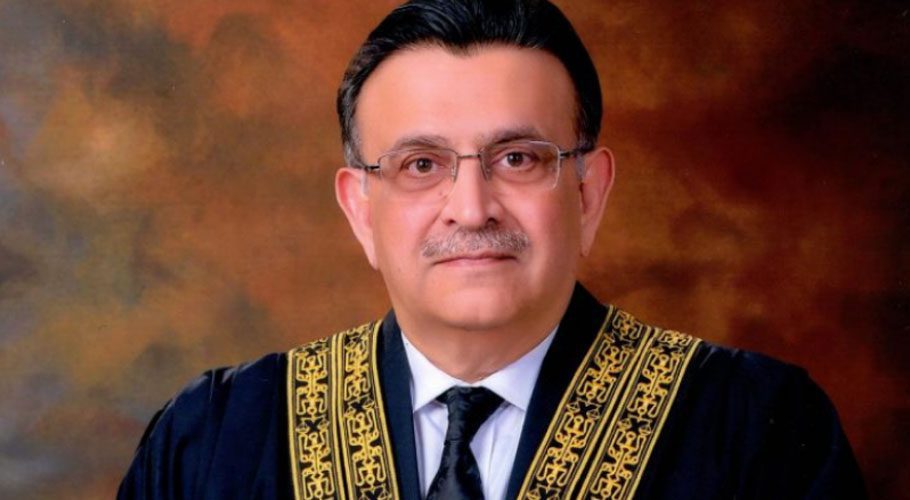ISLAMABAD: Chief Justice of Pakistan (CJP) Umar Ata Bandial, while hearing a presidential reference seeking its interpretation of Article 63-A on Monday, asserted that the Supreme Court judges are cursed at gatherings of “10 to 15,000 people” for doing the jobs and protecting the Constitution.
The chief justice’s comments come days after recently ousted prime minister Imran Khan publicly asked the judiciary to explain why it felt the need to open its doors at midnight on April 9, hours before he was ousted via a successful no-confidence motion in the National Assembly.
In his first public address since losing his government, Imran Khan directly addressed the judiciary, and asked: “My dear judges, my judiciary, I dream that one day the judiciary would stand with the weak people of the society, and not the powerful. I ask you, what crime had I exactly committed that you opened up the courts at midnight?”
Without naming anyone in particular, the chief justice today said that the apex court should be respected. “The court fulfills its constitutional responsibilities. National leaders should defend court decisions,” he added.
“We are cursed for doing our jobs and protecting the Constitution. Why should the court get involved in your political matters?” he said while addressing Islamabad Advocate General Niazullah Khan Niazi.
At the outset of the hearing today, Additional Attorney General Chaudhry Amir Khan requested the apex court to adjourn the hearing in the wake of former attorney general Khalid Jawed Khan’s resignation.
However, Justice Bandial dismissed his request and said that the attorney general’s arguments had been completed. “In my opinion, we should keep hearing the presidential reference,” he said.
Consequently, PTI counsel Babar Awan urged the court to issue notices on party chairman Imran Khan’s petition, which was moved in SC earlier seeking a lifetime ban on defecting lawmakers.
Justice Bandial replied that the court was already hearing a case related to the matter highlighted in Khan’s petition. “All the respondents are here too. This is a case of constitutional debate,” the CJP said, reiterating that the court would continue hearing the presidential reference.
‘Matter should be discussed in parliament’
Meanwhile, Justice Mandokhail observed that some people were in favour of lawmakers being allowed to dissent while others were against it. “The parliament has not clarified about lifetime disqualification,” the judge stated and then wondered if the parliament had deliberately not mentioned it or if it was an oversight.
Justice Mandokhail pointed out that the parliament was still in existence, adding that the Article should perhaps be discussed in the house. “Why are you bringing this matter to the court?” he asked.
At this, Niazi said that the court was responsible for interpreting the Constitution. “Votes are being sold even after Senate elections,” he added. Justice Mandokhail, however, interjected that the parliament should be allowed to make amendments itself.
Violation of 63-A not ‘treason’
Justice Bandial observed that political parties were one of the founding blocks of parliamentary democracy and they have been given protection in four circumstances under Article 63-A.
The CJP recalled that General Ziaul Haq had removed the clause of restriction on dissenting from party lines from the Constitution. “Amendments to the Constitution were made in 1998 when decisions on horse-trading were taken,” he said. “In 2010, under the 18th Amendment, Article 63-A was included.”
Justice Bandial pointed out that violating the Constitution was not a small matter. “Many people violate the Constitution and then have Article 6, which is related to treason, applied to them,” he said, adding that violating Article 63 cannot be turned into a case of treason.
Justice Mandokhail then asked if the court could include the clause of lifetime disqualification itself. “The court has already decided on lifetime disqualification while interpreting Article 62(1)(f),” Islamabad AG Niazi said as he completed his arguments.
Presidential reference on Article 63-A
Before its ouster, the PTI government had filed a presidential reference for the interpretation of Article 63-A, asking the top court about the “legal status of the vote of party members when they are clearly involved in horse-trading and change their loyalties in exchange for money”.
The presidential reference was filed under Article 186 which is related to the advisory jurisdiction of the SC.
In the reference, President Dr Arif Alvi also asked the apex court whether a member who “engages in constitutionally prohibited and morally reprehensible act of defection” could claim the right to have his vote counted and given equal weightage or if there was a constitutional restriction to exclude such “tainted” votes.
He also asked the court to elaborate whether a parliamentarian, who had been declared to have committed defection, would be disqualified for life. It cautioned that unless horse-trading is eliminated, “a truly democratic polity shall forever remain an unfilled distant dream and ambition”.




































